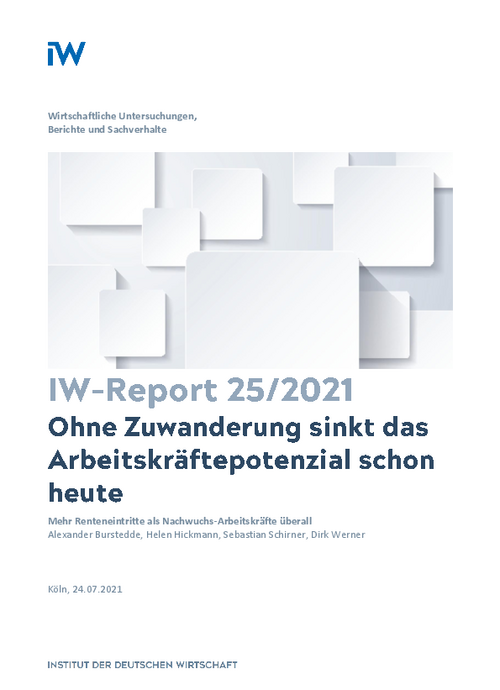Demographic change has been foreseeable for a long time, but has not always led to forward-looking policies. This study shows that demographic change is accelerating significantly and thus requires decisive and timely action.

Without immigration, the potential workforce is already shrinking

Demographic change has been foreseeable for a long time, but has not always led to forward-looking policies. This study shows that demographic change is accelerating significantly and thus requires decisive and timely action.
The working-age population could start to decline now and everywhere if this is not compensated for by immigration. This study analyzes the age structure in all 401 urban and rural districts in Germany. In all regions, the group of 60- to 64-year-olds is larger than the group of 15- to 19-year-olds. This means that when the older people retire, there will not be enough younger people from the same area to fill the gap. Without immigration, there could therefore be more retirements than entries into the labor market in all regions from 2019 to 2024. This is to be understood as a thought experiment and not as a forecast, since in reality there are always migratory movements, as well as labor force participation is constantly changing.
From 2014 to 2019, the demographically induced decline of the labor force has affected primarily eastern Germany. From 2019 to 2024, western Germany and all major cities will also be dependent on immigration to keep their working-age populations constant. Since internal migration within Germany is a zero-sum game, qualified immigration from abroad is needed to stabilize the labor force potential throughout Germany. The decline in the labor force potential does not only affect rural areas. Most cities and rural districts have similar demographic preconditions. It is only the group of regions particularly threatened by a decline in which rural counties make up the large majority (45 out of 49). This group should make a special effort to attract immigrants.
Ultimately, it is not only the development of the labor potential that is relevant for the labor market, but also how well it is used. The positive development of employment figures in recent years was based on rising employment rates and high immigration numbers. The labor force participation of women, the mid-qualified and people aged 55 to 59 has already risen sharply and is therefore likely to contribute much less to employment in the future than it has in the past. Other target groups should therefore be integrated more strongly into the labor market. In addition, a high number of qualified immigrants must be recruited on a permanent basis. In the pandemic year 2020, Germany's population fell for the first time in nine years, mainly because net immigration was 85,000 lower than in the previous year. This illustrates how dependent Germany's population development already is on immigration.
On the basis of this study, the following policy recommendations are derived:
- Increase the employment rate of the over-60s by optimization of incentives and constraints.
- Increase the annual working hours per person in employment, for example by more and better childcare opportunities.
- Use digitization to expand working hours and increase productivity.
- Intensify training of the low-skilled.
- Further improve the framework conditions for more qualified immigration, especially for non-academic workers.
- Emigration regions must become more attractive for people from Germany and abroad.

Without immigration, the potential workforce is already shrinking

More on the topic

Record immigration not only due to flight from Ukraine
In 2022, more people immigrated to Germany than ever before in the history of the Federal Republic. Around 1.46 million more people moved here than left the country, which is more than a quarter more than the previous record of 1.14 million from 2015.
IW
Immigration from Latin America: Successes and potential for securing skilled workers
Against the background of the baby boomers leaving the labour market, Germany will be increasingly dependent on skilled workers from abroad in the coming years in order to secure growth and prosperity.
IW